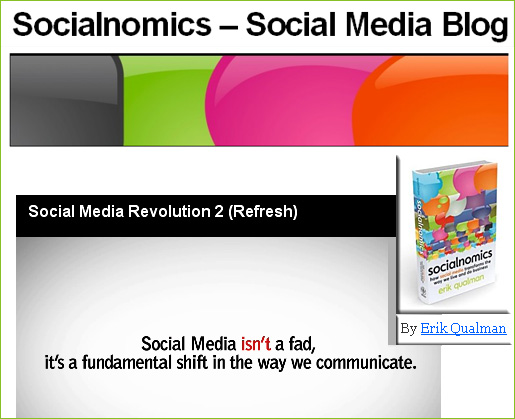Social Media Revolution 2 (Refresh) — from Erik Qualman [via G. Siemens]
Per George:
Erik Qualman’s socialmedia revolution video has been updated. He starts by asking: “Is social media a fad? Or the biggest shift since the industrial revolution?”. While the stats provided are interesting, his questions mistake the effect for the cause. It’s like asking, 150 years ago, “is the railway a fad? Or the biggest shift since the agricultural revolution?”. Of course, the railway was part of the industrial revolution. But it was needed largely because of other trends (economic, societal, technological innovation, etc.). In the same sense, social media is an expression, a carrier, of fundamental changes around information and interaction. It is not, however, the change itself. Three years ago, I communicated a similar concept in It’s not about the tools. It’s about the change*.
*In that posting George states:
It’s the change underlying these tools that I’m trying to emphasize. Forget blogs…think open dialogue. Forget wikis…think collaboration. Forget podcasts…think democracy of voice. Forget RSS/aggregation…think personal networks. Forget any of the tools…and think instead of the fundamental restructuring of how knowledge is created, disseminated, shared, and validated (emphasis DSC).
But to create real change, we need to move our conversation beyond simply the tools and our jargon. Parents understand the importance of preparing their children for tomorrow’s world. They might not understand RSS, mashups, and blogs. Society understands the importance of a skilled workforce, of critical and creative thinkers. They may not understand wikis, podcasts, or user-created video or collaboratively written software. Unfortunately, where our aim should be about change, our sights are set on tools. And we wonder why we’re not hitting the mark we desire. Perhaps our vision for change is still unsettled. What would success look like if we achieved it? What would classrooms look like? How would learning occur? We require a vision for change. It’s reflected occasionally in classroom 2.0 or enterprise 2.0 projects. But the tool, not change centric, theme still arises. We may think we are talking about change, but our audience hears hype and complex jargon.
What is your vision for change?









